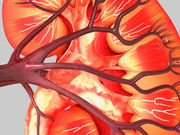With direct-acting antivirals, no adverse events seen when kidneys came from HCV-infected donors
TUESDAY, March 6, 2018 (HealthDay News) — Direct-acting antiviral prophylaxis is safe and prevents chronic hepatitis C virus (HCV) infection after kidney transplantation from HCV-infected donors to noninfected recipients, according to a study published online March 6 in the Annals of Internal Medicine.
Christine M. Durand, M.D., from Johns Hopkins University in Baltimore, and colleagues assessed the tolerability and feasibility of using direct-acting antivirals (grazoprevir and elbasvir) as prophylaxis before and after kidney transplant from HCV-infected donors to non-HCV-infected recipients (HCV D+/R− transplant). The study included 10 HCV D+/R− kidney transplant candidates who were older than 50 years and had no available living kidney donors.
The researchers found that there were no treatment-related adverse events among the 10 HCV D+/R− transplant recipients. Twelve weeks after treatment, no HCV RNA was detected in any recipient.
“If confirmed in larger studies, this strategy should markedly expand organ options and reduce mortality for kidney transplant candidates without HCV infection,” the authors write.
Several authors disclosed financial ties to pharmaceutical companies, including Merck Sharp & Dohme Corp., which partially funded the study.
Abstract/Full Text (subscription or payment may be required)
Copyright © 2018 HealthDay. All rights reserved.








